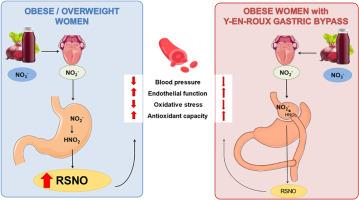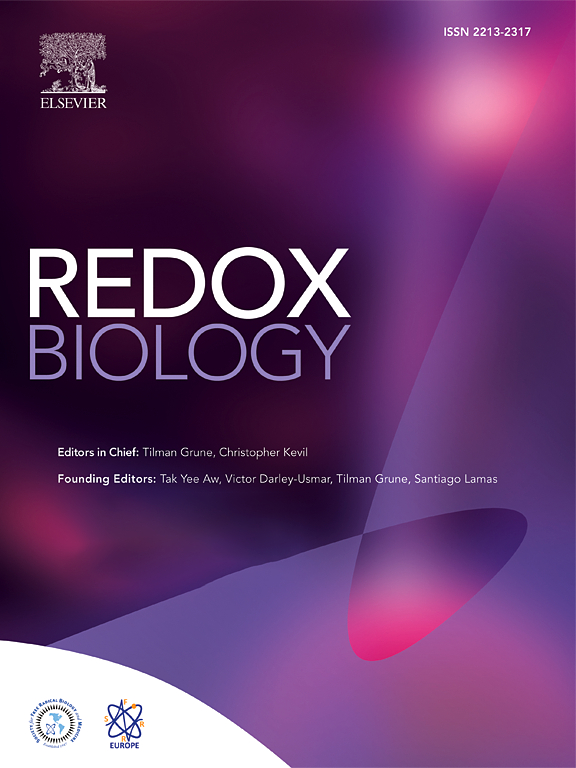减肥手术通过干扰胃中 S-亚硝基硫醇的形成,削弱了硝酸盐对超重妇女心血管功能的改善作用
IF 10.7
1区 生物学
Q1 BIOCHEMISTRY & MOLECULAR BIOLOGY
引用次数: 0
摘要
实验动物模型和人体临床研究表明,无机硝酸盐(NO3-)和富含硝酸盐的食物具有抗氧化作用,并能降低血压。硝酸盐的特殊处理方式,包括其在肠唾液中的再循环、分泌到唾液中、被口腔微生物还原成亚硝酸盐(NO2-),以及胃中依赖于 pH 值的亚硝酸能力,都被认为是硝酸盐产生有益作用的重要因素。肥胖是全球关注的主要健康问题,并与心血管风险增加有关;在这种情况下,硝酸盐是否能降低血压和改善内皮功能尚未得到研究。我们在此对以下假设进行了测试:i)硝酸盐对超重女性的心血管有益;ii)这些有益作用会在接受减肥Roux-en-Y胃旁路(RYGB)手术的女性中减弱。我们的对照临床试验包括 15 名曾接受过 RYGB 手术的女性和 15 名超重女性对照组。所有参与者都接受了为期 14 天的单剂量 0.1 毫摩尔/千克/天的甜菜根提取物形式的硝酸盐。在硝酸盐治疗前后进行了采血、24 小时动态血压测量和内皮功能测试。血浆中亚硝酸盐、硝酸盐和 S-亚硝基硫醇(RSNO)的浓度是通过臭氧还原化学发光法测定的,而硫代巴比妥酸活性物质(TBARS)和总抗氧化能力(TAC)则是通过读板机测定的。硝酸盐能降低对照组的血压并改善内皮功能,但不能改善曾接受过减肥手术的妇女的内皮功能。在对照组中,硝酸盐还能提高循环中硝酸盐/亚硝酸盐和 RSNO 的水平,但在 RYGB 手术后,尽管亚硝酸盐的浓度增加得更多,但后者的作用却减弱了。同样,硝酸盐能提高对照组的抗氧化反应,但不能提高曾接受过减肥手术的妇女的抗氧化反应。这是首次研究表明,硝酸盐对肥胖症患者的心血管有益,而 RYGB 手术引起的形态/功能改变会阻止胃中 RSNO 的形成,从而削弱硝酸盐的功效。本文章由计算机程序翻译,如有差异,请以英文原文为准。

Bariatric surgery blunts nitrate-mediated improvements in cardiovascular function of overweight women by interfering with gastric S-nitrosothiol formation
Inorganic nitrate (NO3−) and nitrate-rich foods have been shown to exert antioxidative effects and lower blood pressure in experimental animal models and human clinical studies. The specific handling of nitrate, including its enterosalivary recirculation, secretion into saliva, oral microbial reduction to nitrite (NO2−), and the pH-dependent nitrosative capacity in the stomach have all been recognized as being important for nitrate's beneficial effects. Obesity is of major health concern worldwide and associated with increased cardiovascular risk; whether nitrate lowers blood pressure and improves endothelial function in this setting has not been investigated. We here tested the hypotheses that i) nitrate elicits cardiovascular benefits in overweight women; and ii) these beneficial effects would be diminished in women who underwent bariatric Roux-en-Y gastric bypass (RYGB) surgery. Our controlled clinical trial included 15 women with prior RYGB surgery and 15 overweight female controls. All participants received a single dose of 0.1 mmol/kg/day nitrate in the form of a beetroot extract for 14 days. Blood collection, 24-h ambulatory blood pressure measurements and endothelial function tests were performed before and after nitrate treatment. Plasma nitrite, nitrate, and S-nitrosothiol (RSNO) concentrations were determined by ozone-based reductive chemiluminescence while thiobarbituric acid reactive substances (TBARS) and total antioxidant capacity (TAC) were measured using plate-reader based assays. Nitrate reduced blood pressure and improved endothelial function in controls, but not in women with prior bariatric surgery. Nitrate also increased circulating nitrate/nitrite and RSNO levels in controls, but the latter was blunted following RYGB surgery despite even larger increases in nitrite concentrations. Similarly, nitrate increased antioxidant responses in controls but not in women with prior bariatric surgery. This is the first study to show that nitrate exerts beneficial cardiovascular effects in obesity and that the morphological/functional modifications elicited by RYGB surgery abrogates nitrate's effectiveness by preventing gastric RSNO formation.
求助全文
通过发布文献求助,成功后即可免费获取论文全文。
去求助
来源期刊

Redox Biology
BIOCHEMISTRY & MOLECULAR BIOLOGY-
CiteScore
19.90
自引率
3.50%
发文量
318
审稿时长
25 days
期刊介绍:
Redox Biology is the official journal of the Society for Redox Biology and Medicine and the Society for Free Radical Research-Europe. It is also affiliated with the International Society for Free Radical Research (SFRRI). This journal serves as a platform for publishing pioneering research, innovative methods, and comprehensive review articles in the field of redox biology, encompassing both health and disease.
Redox Biology welcomes various forms of contributions, including research articles (short or full communications), methods, mini-reviews, and commentaries. Through its diverse range of published content, Redox Biology aims to foster advancements and insights in the understanding of redox biology and its implications.
 求助内容:
求助内容: 应助结果提醒方式:
应助结果提醒方式:


